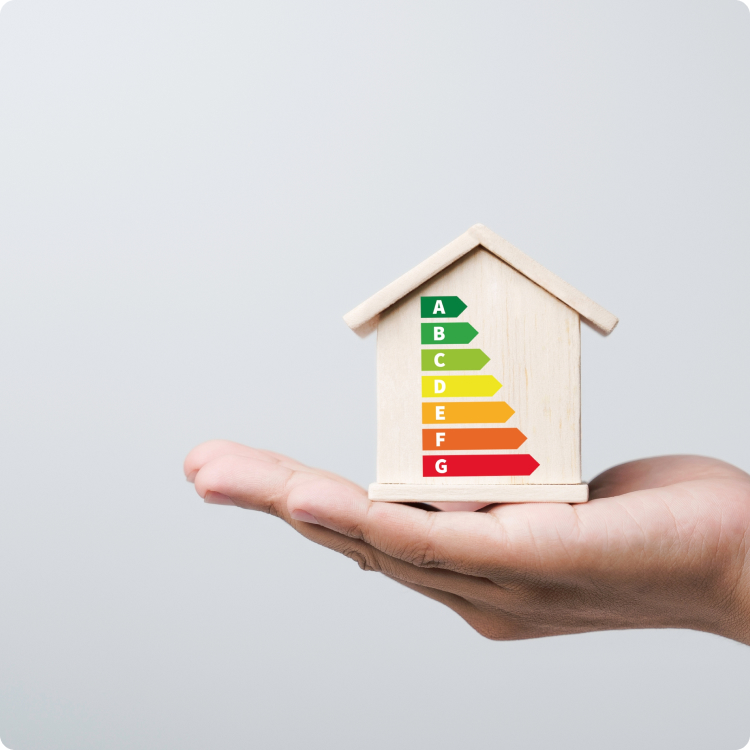
What is energy efficiency?
The benefits of energy efficiency

May 2025

Approximately 17 minutes
At the Iberdrola Group, we ensure efficient energy management throughout its energy chain and act to optimise the use of energy in production, transmission and distribution, as well as in end use. We also contribute to a more efficient use of energy by consumers, through information, training and the supply of solutions and technologies. Find out everything you need to know about energy efficiency.
Energy is present in virtually everything we do, whether we turn on a light, watch TV, drive a car or simply use a mobile phone. However, in the midst of our daily actions, a key question arises: how can we harness this resource more effectively and sustainably? Discover the main aspects of energy efficiency and its relationship with Iberdrola's work in the fight against climate change.
How much do you know about energy efficiency? Test your knowledge with this quiz.
1 Which of these appliances consumes the most energy?
That’s correct!
Incorrect. The correct answer is C. Refrigerator.
2 Which of the SDGs achieves the goal of ensuring access to affordable, secure, sustainable and modern energy for all?
That’s correct!
Incorrect. The correct answer is C. SDG 7.
3 Which of the following residential heating systems is the most energy efficient?
That’s correct!
Incorrect. The correct answer is B. Heat pump.
4 What 2 indicators are shown on a house’s energy rating label?
That’s correct!
Incorrect. The correct answer is A. House’s annual energy consumption and annual CO₂ emissions.
5 Heat pumps can extract energy from:
That’s correct!
Incorrect. The correct answer is D. All of the above.
It's time to learn from scratch!
0/5 right
That’s OK! This quiz was just the beginning, and now you have the perfect opportunity to learn about energy efficiency. Read the article and find out how you can optimise your day-to-day energy consumption – you're bound to get more right next time!
It's time to learn!
1/5 right
Don't worry! This quiz was a good starting point. There’s still a lot to discover about energy efficiency. But that's OK, that's what we're here for. Read the article and become an expert on the subject.
You need to learn a bit more
2/5 right
You seem to have the basics down, but there’s room for improvement. This is the perfect opportunity to learn more about energy efficiency. Read on and find out how to make better use of energy.
Doing good, but still some room for improvement
3/5 right
You’re on the right track! You have the basics in energy efficiency down, but you can still learn more. We encourage you to read on to answer any questions and improve your energy habits.
Very good
4/5 right
Congratulations! This shows that you know a lot about energy efficiency. But there’s always room for improvement. Read on to discover new things and improve your knowledge even more.
Energy efficiency expert
5/5 right
Impressive! You got all the questions right. You know a great deal about energy efficiency. Still, there’s always something new to learn, so we invite you to read the article and discover more and some tips for optimising energy consumption.
What is energy efficiency?
Energy efficiency is a fundamental concept in the responsible management of the resources available on our planet. It refers to the optimisation of energy use, seeking to obtain maximum performance with the lowest possible consumption. In other words, it is about performing activities and operating devices and systems more intelligently, with the aim of reducing energy waste and minimising the associated environmental impact.
Understanding and adopting energy efficiency practices is essential to build a more sustainable and resilient future, where responsible management of energy resources plays a crucial role in preserving the planet for future generations. This can be achieved by adopting different measures at the technological level, but also through small everyday gestures in our homes.
What are the benefits of energy efficiency?
In a world marked by increasing demand for resources, energy efficiency emerges as a fundamental principle to address today's challenges. More than a simple practice, it is a concept that not only impacts consumers' wallets, but also leaves a significant footprint on the health of the planet. Here are some of its most representative benefits:
What is energy efficiency and how to achieve it in our daily life?
What uses the most energy at home?
Heating
Household appliances
Domestic hot water
Cooking
Lighting
Air conditioning
Household appliances that consume the most


Source: Institute for Energy Diversification and Saving (IDAE, Spain)
How is energy efficiency calculated?
It’s important to know the calculation used to learn more about energy efficiency  External link, opens in new window. and to evaluate the performance of the ratio of energy used to energy produced. International standards have been developed to establish clear and consistent standards.
External link, opens in new window. and to evaluate the performance of the ratio of energy used to energy produced. International standards have been developed to establish clear and consistent standards.

ISO 50001 Standard
ISO 50001 provides a structured framework for organisations, regardless of size or industry, to develop and implement effective energy management systems. It aims to help companies become more efficient and continuously improve the energy efficiency of their processes, the costs from energy consumption and the emission of greenhouse gases.

IPMVP
On the other hand, the IPMVP (International Performance Measurement and Verification Protocol) is a set of principles and procedures that provides guidelines for the measurement and verification of energy performance. This protocol is particularly valuable when seeking to evaluate and demonstrate the results of a company's or organisation's energy efficiency projects.

ISO 50001 Standard
ISO 50001 provides a structured framework for organisations, regardless of size or industry, to develop and implement effective energy management systems. It aims to help companies become more efficient and continuously improve the energy efficiency of their processes, the costs from energy consumption and the emission of greenhouse gases.

IPMVP
On the other hand, the IPMVP (International Performance Measurement and Verification Protocol) is a set of principles and procedures that provides guidelines for the measurement and verification of energy performance. This protocol is particularly valuable when seeking to evaluate and demonstrate the results of a company's or organisation's energy efficiency projects.
Energy saving and efficiency in different sectors
The quest for more efficient and sustainable energy consumption has become a global priority that is present in various sectors: from residential and commercial to industry and large-scale energy infrastructure.
In the current context, these areas of involvement use equipment, techniques and systems that, through the implementation of innovative technologies, seek to maximise production and minimise losses. A move that represents a fundamental commitment to sustainability and environmental impact mitigation.
Every sector plays a crucial role in building an energy-conscious society. Households, industry, business management and the energy sector are strategic areas for the implementation of energy saving and efficiency  Enlace externo, se abre en ventana nueva. measures that lay the foundations for a more sustainable future.
Enlace externo, se abre en ventana nueva. measures that lay the foundations for a more sustainable future.
Efficient household devices and awareness of responsible consumption contribute to a more sustainable use of energy.
Smart supply chain management in industry not only reduces costs, but also reduces the environmental footprint.
Energy efficiency technologies reinforce corporate social responsibility and improve business competitiveness.
Efficient practices drive more sustainable energy generation, fostering the transition to a cleaner and more efficient system.
Sustainability and energy efficiency
The convergence between sustainability and the search for efficient solutions has become a fundamental axis for addressing environmental challenges. Awareness of the need to protect our planet has put sustainability and efficiency at the centre of global strategies, involving the adoption of practices to better protect and manage the resources at our disposal.
How does energy efficiency help?
The concept of energy efficiency is undoubtedly a catalyst for achieving sustainability goals, providing a set of tools and practices that transform the way we consume energy. From reducing operating costs to reducing our environmental footprint, efficiency impacts on multiple fronts of our lives.
Therefore, energy efficiency emerges as a key ally in the achievement of strategies such as Sustainable Development Goal 7 (SDG 7) established by the United Nations, with the aim of ensuring access to affordable, secure, sustainable and modern energy for all. This sustainable growth goal not only contributes to optimising the use of resources, but also takes responsibility for reducing pollution and strengthening the resilience of the global energy system.

Renewable Energies and Energy Efficiency
The convergence between renewables and energy efficiency marks a crucial milestone in the search for sustainable solutions to our energy needs. Renewable energies, such as solar, wind and hydropower, represent clean and abundant sources that offer a promising alternative to fossil fuels. However, to maximise their impact and ensure a sustainable energy future, it is essential to complement the use of these sources with efficient practices.
Energy efficiency
n this context, efficient energies emerge as a strategic approach that seeks to boost the generation of renewable energy through technologies that optimise the use of resources.

Solar energy, captured through photovoltaic panels, transforms sunlight into electricity in a clean way and represents the possibility of generating energy in the same place where it is consumed, which reduces losses associated with long-distance transport

Wind energy harnesses the power of the wind to move wind turbines and generate electricity for its consumers, standing out for its low environmental impact and its capacity to produce energy in remote regions.

Hydroelectric power is another clean energy source that is emerging as an efficient and environmentally friendly option.
In addition to the integration of the aforementioned renewables into the energy mix, it is essential to make progress in energy storage technologies, which will improve the efficiency of the electricity system. The ability to store energy generated during production peaks, for use at times of high demand or when renewable sources are not active, plays a crucial role in balancing the electricity supply.
The energy efficiency label
The energy efficiency label is a tool that provides consumers with information on the energy performance of a given household appliance, electronic device or any other energy-consuming appliance. Generally, these labels classify products on a scale with letters and colours ranging from A with the colour green (most efficient) to G with the colour red (least efficient), clearly indicating their efficiency in terms of energy consumption.
This type of certification, affixed to each product in the form of a sticker, plays a key role in promoting sustainable practices that have a positive impact on the conservation of natural resources. Moreover, it not only benefits individual consumers, but also supports governmental efforts to achieve broader energy efficiency and energy saving  Enlace externo, se abre en ventana nueva. goals.
Enlace externo, se abre en ventana nueva. goals.
The energy efficiency label is a system created by the European Union (EU) to standardise and make it easier to identify energy efficient products. The first version of this classification was introduced by the EU in 1992, and several updates have been applied since then. In 2021, for example, there was a major revision that simplified the efficiency ratings. Although the system was established at the European level through directives and regulations, it must then be implemented by Member States within their national legislation.
In other countries, there may not be a mandatory unified labelling system. This is the case in the United States, which, unlike EU countries, has certain regulations from different agencies on the minimum energy efficiency standards they must comply with.
The energy efficiency label and its scale
Select each energy class to find out the associated consumption.
Energy class

consume less than 55 % of the average consumption of traditional appliances

consume between 55 % and 75 % of average consumption

consume between 75 % and 90 % of average consumption

consume between 90 % and 100 % of average consumption

consume between 100 % and 110 % of average consumption

consume between 110 % and 125 % of average consumption

consume more than 125 % of average consumption
Iberdrola and energy efficiency
At the Iberdrola Group, we view energy efficiency from a threefold perspective:
Objective

We promote ecoefficiency by gradually reducing the environmental impact of our operations, facilities, products and services
Progress

Tonnes of CO2 emissions avoided
Data at the end of 2024. Information extracted from the "Digital Annual Integrated Report & Sustainability Information 2024".
Our energy efficiency projects
Home automation
Among the systems designed to save on bills and achieve a more efficient reality is home automation, a term that refers to the set of platforms or technologies that are used to automate the activities of a home or building. At Iberdrola we offer the Smart Home  External link, opens in new window. so that you have greater comfort and efficiency in your home. In this service you will find a series of automatic functions such as the Smart Thermostat, Smart Climate Control or Smart Plug. With the Smart Assistant
External link, opens in new window. so that you have greater comfort and efficiency in your home. In this service you will find a series of automatic functions such as the Smart Thermostat, Smart Climate Control or Smart Plug. With the Smart Assistant  External link, opens in new window. , for example, you can move towards the complete automation of your home: it allows you to save and find out the consumption of each appliance from anywhere with our own app, as well as receiving personalised advice on how to save more on your bill.
External link, opens in new window. , for example, you can move towards the complete automation of your home: it allows you to save and find out the consumption of each appliance from anywhere with our own app, as well as receiving personalised advice on how to save more on your bill.

Air conditioning
At Iberdrola, we implement efficiency measures at our buildings and offices around the world. Thus, the Iberdrola Tower in Bilbao, the Iberdrola Training and Innovation Campus in Madrid, and Ochil House, the headquarters of ScottishPower in Glasgow, are some symbols of the Group's commitment to sustainability and energy efficiency. The application of these measures resulted in savings of 6,239 GJ in 2022. To learn more about these and other measures we have implemented, please see our Sustainability Report [PDF].
In addition, through our innovative product Smart Clima  Enlace externo, se abre en ventana nueva. , we are committed to refurbishment projects and efficient technology, providing our customers with solutions that promote energy savings and the decarbonisation of their homes, through efficient electric air conditioning technologies (aerothermal or geothermal) and actions on thermal insulation. We also promote the creation of heat networks that enable the supply of residual thermal energy from renewable energy installations to buildings and homes.
Enlace externo, se abre en ventana nueva. , we are committed to refurbishment projects and efficient technology, providing our customers with solutions that promote energy savings and the decarbonisation of their homes, through efficient electric air conditioning technologies (aerothermal or geothermal) and actions on thermal insulation. We also promote the creation of heat networks that enable the supply of residual thermal energy from renewable energy installations to buildings and homes.

Case study of home aerothermal energy and solar self-consumption
Home’s stats
-
Location: Alicante
-
Climate Zone: B
-
Single-family
-
Surface area: 230 m²
-
Year of construction: 2006
Total kWh consumption
6,858 kg CO₂/year
2,442 kg CO₂/year
64% Reduction in emissions
Source: Own information obtained from the analysis of an Iberdrola client. Consumption data obtained from energy bills.
More about energy efficiency
Thanks to digitalisation and investment in R&D&I, we market a wide range of products and services that promote efficiency, energy savings and environmental protection, while placing the customer at the centre by providing them with greater connectivity and decision-making power, offering smart and innovative solutions in both the residential and industrial sectors. Among the initiatives we undertake in different countries, the following stand out:
Spain
Highlights include the Green Mobility Plan, which promotes the use of electric vehicles among our workforce, Smart Mobility  External link, opens in new window. , a solution for electric vehicles that includes the installation and management of the charging infrastructure, Smart Solar
External link, opens in new window. , a solution for electric vehicles that includes the installation and management of the charging infrastructure, Smart Solar  External link, opens in new window. , Smart Home and Smart Services, aimed at improving the management of energy consumption through the use of solar technology (self-consumption)
External link, opens in new window. , Smart Home and Smart Services, aimed at improving the management of energy consumption through the use of solar technology (self-consumption) External link, opens in new window. , control of heating and electricity services for a smart home, and Industrial Heat, focused on electrifying industrial processes.
External link, opens in new window. , control of heating and electricity services for a smart home, and Industrial Heat, focused on electrifying industrial processes.
United States
Through our subsidiary Avangrid, we work in the United States to promote energy efficiency through various initiatives under the Smart Energy  External link, opens in new window. programme. These range from electric vehicle incentives, clean heating rebate programmes and affordable multifamily efficiency programmes to smart meters, electronic billing and energy cost calculators. The Avangrid family of companies is constantly innovating so our utility customers can make smart energy choices. It is managed through local subsidiaries: CMP
External link, opens in new window. programme. These range from electric vehicle incentives, clean heating rebate programmes and affordable multifamily efficiency programmes to smart meters, electronic billing and energy cost calculators. The Avangrid family of companies is constantly innovating so our utility customers can make smart energy choices. It is managed through local subsidiaries: CMP  Enlace externo, se abre en ventana nueva. , NYSEG
Enlace externo, se abre en ventana nueva. , NYSEG  Enlace externo, se abre en ventana nueva. , RG&E
Enlace externo, se abre en ventana nueva. , RG&E  Enlace externo, se abre en ventana nueva. , UI
Enlace externo, se abre en ventana nueva. , UI  Enlace externo, se abre en ventana nueva. , SCG
Enlace externo, se abre en ventana nueva. , SCG  Enlace externo, se abre en ventana nueva. , CNG
Enlace externo, se abre en ventana nueva. , CNG  Enlace externo, se abre en ventana nueva. , MNG
Enlace externo, se abre en ventana nueva. , MNG  Enlace externo, se abre en ventana nueva. y BGC
Enlace externo, se abre en ventana nueva. y BGC  Enlace externo, se abre en ventana nueva. .
Enlace externo, se abre en ventana nueva. .
United Kingdom
In the United Kingdom, through ScottishPower, we offer advisory and energy management services  External link, opens in new window. for households. Of particular note is the installation of smart meters and providing customers with the Energy Insights tool, which works with detailed data every half hour to optimise energy consumption.
External link, opens in new window. for households. Of particular note is the installation of smart meters and providing customers with the Energy Insights tool, which works with detailed data every half hour to optimise energy consumption.
Brazil
Through Neoenergia, our subsidiary in Brazil, we implement projects External link, opens in new window. to replace lamps with LED systems, implement solar photovoltaic power plants, mobilise recycling programmes and promote educational actions that raise awareness with information on the benefits of changing habits in energy use.
External link, opens in new window. to replace lamps with LED systems, implement solar photovoltaic power plants, mobilise recycling programmes and promote educational actions that raise awareness with information on the benefits of changing habits in energy use.
Mexico
In Mexico, we offer advisory and energy management services to help companies optimise energy use and adopt efficiency technologies. These initiatives are organised through the Smart Solutions External link, opens in new window. division, a set of digital, intelligent and innovative solutions to decarbonise processes through clean energy. Highlights include Smart Solar, the implementation of cooling-heating technologies and the promotion of green hydrogen.
External link, opens in new window. division, a set of digital, intelligent and innovative solutions to decarbonise processes through clean energy. Highlights include Smart Solar, the implementation of cooling-heating technologies and the promotion of green hydrogen.
Some efficient solutions
At Iberdrola, we promote innovative projects aimed at improving the efficiency of our assets in operation and their associated processes, favouring the integration of renewable energies through various initiatives linked to the field of energy storage and reducing costs in facility design and construction. We invest in efficient solutions within renewable energies, such as:
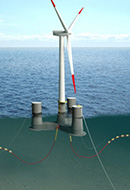
Floating offshore wind
A milestone to boost renewables through innovation.
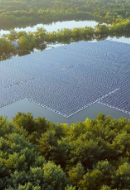
Floating photovoltaic solar energy
Do you know about floating photovoltaic solar energy?
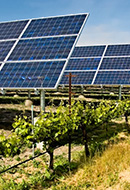
Agrovoltaics
When agriculture and renewables go hand in hand.
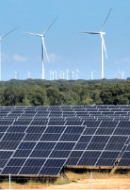
Hybrid energy
When combining renewables makes them stronger.
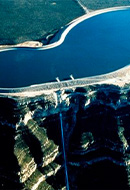
Pumped-storage hydropower
Do you know what pumped-storage hydropower stations are used for?

Energy storage
The key to a decarbonised future.
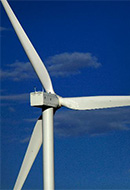
Wind blade recycling
A new challenge for wind energy.





























